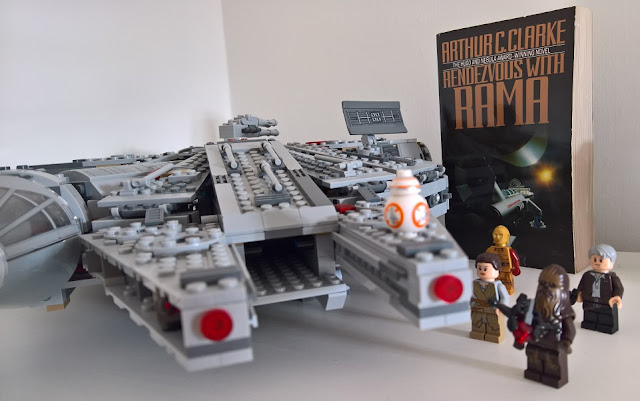"If such a thing had happened once, it must surely have happened many times in this galaxy of a hundred billion suns."
I don't often read sci-fi. It's not that I have anything against the genre; that which I have read, I've mostly enjoyed. I love Star Wars and the news I read is almost exclusively technology-focused and I have a Computer Science degree and I found it very hard to get a girlfriend before I captured this one, so I'm sure I tick almost every box in Amazon's Probable Sci-Fi Reader list; but no, what I normally choose to read is largely dark, depressing, American, literary fiction. General fiction, you'd probably call it. Stories about young men feeling sorry for themselves and learning the hard way what it takes to be a man, you know the kind.
But the novel I've been writing for the past two years (at least), and of which I recently finished the first draft, would probably be counted as science fiction, since it's set on another planet. And in the future. I mean, I still think it's literary fiction - what do the location and the year matter? That's just the backdrop to my deep, well-formed, Booker-prize-deserving characters. But try telling that to a literary agent in your covering letter.
So I'm reading more sci-fi. Because I have to, if I want to fit in when I'm a famous author.
So, I read Rendezvous with Rama. And I'm going to review it for you. And that was the longest, most pointless introduction to a book review that anyone has ever written. But it's all about me, so I'll leave it in. I love me.
In Rendezvous with Rama, we join humanity in the 2130s (very close to the time in which my book is set - maybe I'll have to change that), when it has colonised most of the planets in the solar system, and a meteor strike in Italy has caused such a huge ruckus that a system has been set up to scan the skies for incoming space objects, so we all have a bit of warning in future. After running happily for a few years, one normal Tuesday (probably), this system spots a huge asteroid heading toward the sun, travelling extremely quickly and rotating like a dizzy dinosaur. Probes are dispatched, photographs are photographed, and it is found that this asteroid is perfectly cylindrical, fucking huge, and therefore… DUN DUN DUN… not an asteroid at all, but a spaceship.
Everyone is all like shiiiiiit boi, and the closest vessel to Rama (which is the name we give this interstellar monstrosity) - the Endeavour - is sent to land on its face and explore its innards. The majority of the book, therefore, is spent following the Endavour's crew as they discover, bit by bit, the tiny world inside of this humungous ship, and try to fathom what race could possibly have sent it our way.
Reading it, I often found I had a smile on my face. The language is light and easily read, the characters likable enough (if a little two-dimensional), and the story believable enough that it draws you in; but the exciting part, the part that put the smile on my hairy face, was the magic of Rama. I liked the mysteries revealed a little at a time, and the eternal promise that in the next chapter, perhaps, a Raman might come out to play. I liked the idea of Rama. This huge cylinder that could contain anything at all, inside of which Clarke builds a world from scratch.
Unfortunately, though, I was left a little disappointed by the limits of what he did create. Perhaps I'd built up the possibilities too much in my head. There is, after all, only so much you can fit into one novel. But still, I felt like there could have been more, and the ending could have been more satisfying. I won't go into detail, it wouldn't be right; but suffice to say, at the end, I was more, "Oh, okay then…" than "Wow!"
Regardless, it gripped me, which seems to be getting harder and harder these days. I never dreaded opening the book and I didn't feel relieved finishing it. And those are all good points, when you're a moody stinker like me. So, for giving me a good grin on a few journeys to work, and for making me feel the magic of an imagined alien race, I'll give it 4/5.



